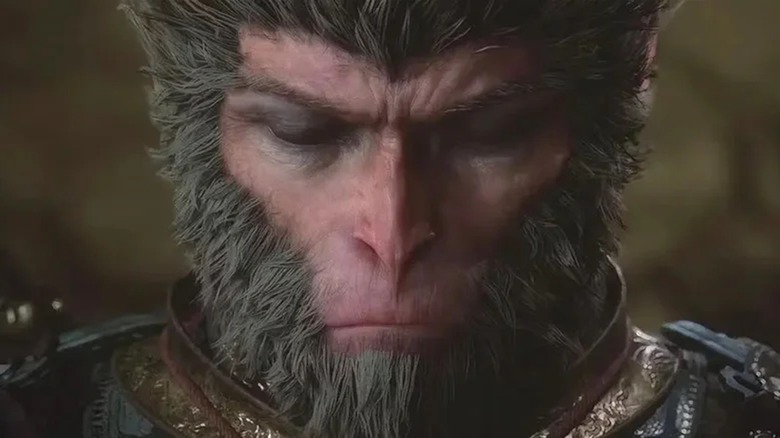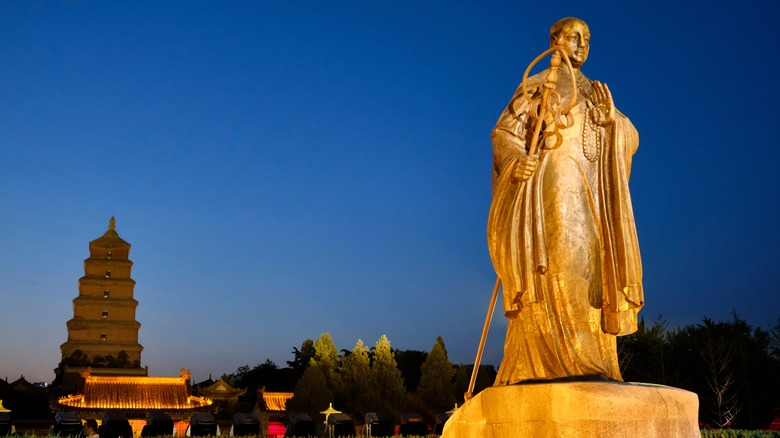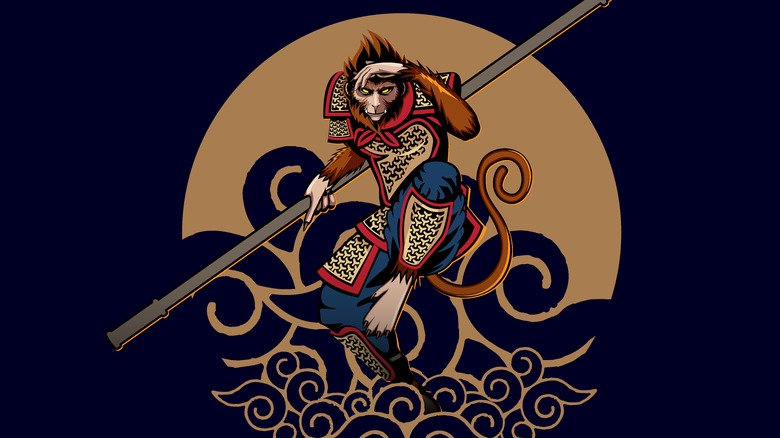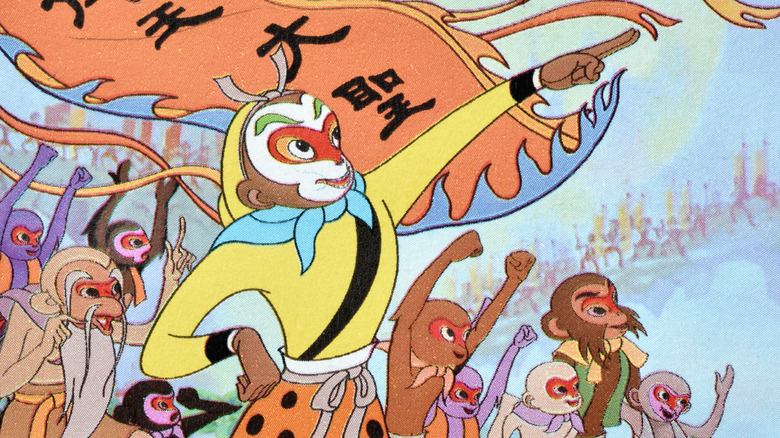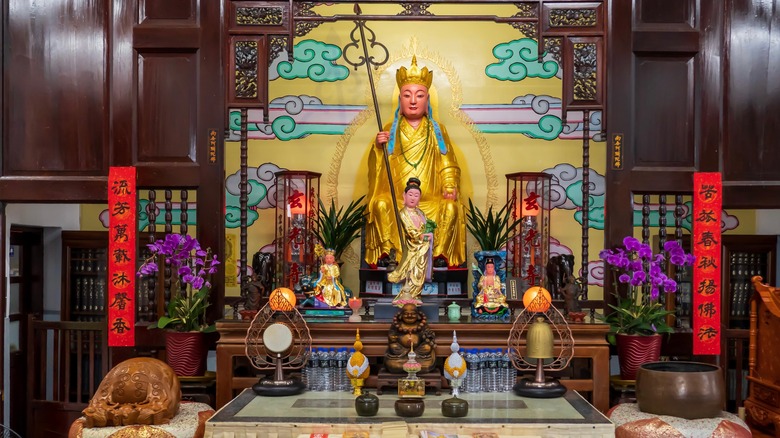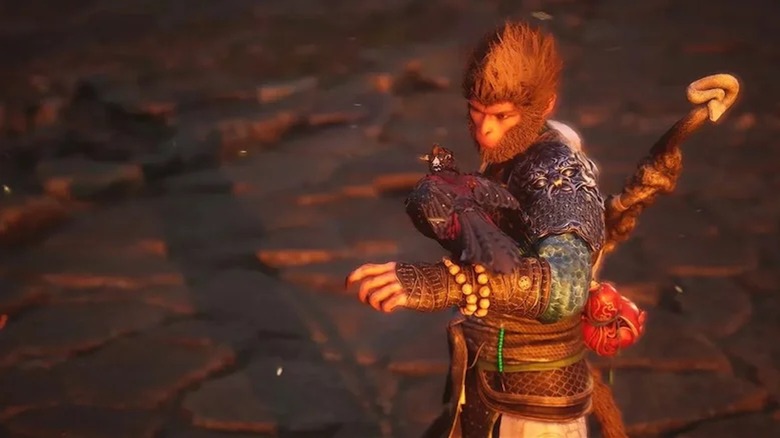The Real-Life Origins Of Black Myth: Wukong In Chinese Mythology
"Black Myth: Wukong" shattered video game records when it released in August 2024. It surpassed other blockbuster record-setters like "Elden Ring," "Cyberpunk 2077," and "Baldur's Gate 3," becoming the most-played single-player PC game on Steam ever, with a peak of over 2.2 million players. The action role-playing title was created by Chinese startup Game Science, which houses just 140 employees. Unsurprisingly, it's gained tons of support from its home country. According to The Straits Times, Malaysia's Chinese-language Oriental Daily reported that at the time of the game's release, some firms in China were even covering the cost of "Black Myth" for their employees and providing them with time off to dive into the adventure.
The game's popularity seems to at least partly be because of its ties to classic Chinese literature and mythology. In particular, "Black Myth: Wukong" is based on the legendary Chinese novel, "Journey to the West." Published in 1592 by novelist and poet Wu Cheng'en during the Ming dynasty (1368–1644), the author pulls from Chinese folklore and literary works to tell the real-life tale of a Buddhist monk named Xuanzang through the character Tang Sanzang, who travels to India to find sacred Buddhist texts called sutras. Xuanzang lived from 602 to 644 and successfully returned to China with the works, though like "Black Myth," "Journey to the West" is fictionalized with stories of demons, monsters, and most notably, Sun Wukong — aka the Monkey King — and his battle against Heaven.
A classic Chinese tale
In "Black Myth: Wukong," players take on the role of the Destined One, aka the Monkey King, after the events of "Journey to the West." The novel is sometimes believed to be the first mention of Sun Wukong, but he might be an even older figure in Chinese mythology. Notably, his precursor, the Monkey Pilgrim, appears as far back as the Song dynasty (960–1279) hundreds of years earlier. Nevertheless, he was popularized by "Journey to the West," which paints an allegorical tale of monk Xuanzang's journey to India and return to China. After arriving home, he translated 75 of his obtained sutras into Chinese and paved the way for Buddhism in the country and beyond.
The story begins in what probably sounds all too familiar hundreds of years later: A magic stone breaks. According to Chinese legend, the stone had sat atop the Flowers and Fruit Mountain since the beginning of time. "Ever since Creation began it had been receiving the truth of Heaven, the beauty of Earth, the essence of the Sun and the splendour of the Moon; and as it had been influenced by them for so long it had miraculous powers," the book reads. "It developed a magic womb, which burst open one day to produce a stone egg about the size of a ball." Wind blew on the egg, and from it the Monkey King was born — "a stone monkey, complete with the five senses and four limbs," who eventually learns to walk.
Supernatural training on a journey to immortality
As "Journey to the West" continues, the Monkey King gets to know other monkeys on the Mountain of Flowers and Fruit and ends up establishing a home for them in the Water Curtain Cave (both locations have what are believed to be their synonymous real-world counterparts in the city of Lianyungang in China's Jiangsu province). He eventually becomes their king, establishing a kingdom of rulers, officers, assistants, etc., and all is going well — too well, for Sun Wukong. Awareness of mortality leads to a fear of death, which takes its toll on him. "The time will come when we are old and weak, and the underworld is controlled by the King of Hell," he told his followers after breaking down in tears at a banquet. "When the time comes for us to die, we won't be able to go on living among the Blessed, and our lives will have been in vain."
This despair sends Sun Wukong on a journey to find immortality, one that leads him to the Spirit Tower Heart Mountain and its Cave of the Setting Moon and the Three Stars. Here he meets the immortal sage Puti Zushi, who takes him on as his disciple and teaches the Monkey King to wield magical powers through practices of Taoism. It is these powers that you'll see him use in "Black Myth: Wukong" — cloning himself by pulling his hair, transforming into other creatures, and the cloud somersault (a magical leap that can send him 60,000 miles per jump).
A spot in the heavens
The next twist in the story of "Journey to the West" is one that you've probably heard in modern tales and parables — as the Monkey King's power grows, so too does his arrogance. In pursuit of more strength, he petitions for a spot in Heaven among the celestial bureaucracy. But the Jade Emperor tricks him into being the Protector of the Horses — a lowly position akin to that of a modern stable boy.
Sun Wukong eventually discovers he's been duped and wages a war on heaven. After stealing the peaches of eternal life, he enters the Tushita Palace, "the highest of the thirty−three heavens, where Lord Lao Zi of the Great Monad reigns" (in real-life, Laozi is the reputed founder of Taoism and one of the author's of its seminal "Tao Te Ching"). Here, the Monkey King steals the golden pills of immortality elixir and escapes through the West Gate of Heaven using an invisibility spell.
Pagoda-Bearing Heavenly King Li Prince — commander of the heavenly army — wages war on the Monkey King in a "terrifying" battle. But Sun Wukong defeats his 100,000 celestial warriors, the Four Heavenly Kings, and the military leader's son, Prince Nezha (Nezha is a protection deity in Chinese mythology). Sun Wukong's power is too great for Heaven, so the celestial bureaucracy eventually petitions the Buddha, who captures and imprisons him in the Five Elements Mountain.
A new journey
It's at this point that "Journey to the West" turns toward the real story of Buddhist monk Xuanzang. Imprisoned in the mountain, the Monkey King reflects on his actions and is eventually released, on one condition: He acts as a bodyguard for Buddhist monk Tang Sanzang (above), the character based on Xuanzang. From here the story covers Sun Wukong's travels with Sanzang and other sinners seeking enlightenment, fighting demons and monsters called Yaoguai along the way. These creatures show up in "Black Myth: Wukong" as Yaoguai Chiefbosses and the more powerful Yaoguai King story bosses.
The term "Yaoguai" is a Chinese term that often — but not always — refers to demons. Like the Monkey King, they have also acquired their supernatural powers using Taoist practices and want to achieve immortality. Yaoguai kings, like their "Black Myth" counterparts, are known to lord over less-powerful demons. In "Journey to the West," Yaoguai seek to gain deity status by consuming the flesh of holy men.
A similar legacy?
Xuanzang's 16-year journey to India and back was one of great importance. One only has to look at the welcome he received upon returning home. As translated by Li Rongxi in "Biography of the Tripiṭaka Master of the Great Ci'en Monastery of the Great Tang Dynasty:" "All the monasteries send monks and nuns in their ceremonial robes for the occasion. The people vie with one another in preparing their best banners, tapestries, umbrellas, precious tables, and carriages ... with the sound of pearls and jade hanging from their belts tinkling in the air, amidst folden flowers scattered on the road. Scholars and local officials line the ceremonial path."
After he completed the 10,000-mile trek on foot and horseback and translated 75 Buddhist sutras into Chinese, the religion became more prevalent and understood not just in China but around the world. It's not surprising then that "Black Myth: Wukong" has gained so much attention, and it may end up carrying a legacy similar to Xuanzang himself — this time by bringing Chinese mythology to more people and helping them to better understand it. "It's not just a Chinese game targeting the Chinese market or the Chinese-speaking world," Haiqing Yu, a professor at Australia's RMIT University, told the BBC. "Players all over the world [are playing] a game that has a Chinese cultural factor."
In a piece for Asia Times, author and lecturer Gerui Wang suggested the game's success is rooted most in the relatability of its mythology's subject matter. "The game's themes — curbing uninhibited desires, battling powerful heavenly gods, fighting against unfair treatment — resonate with modern players," she wrote. "These themes address issues like economic inequality, environmental degradation and exploitation by powerful industries, making the story more than just a game; it's a reflection of what society needs right now."
